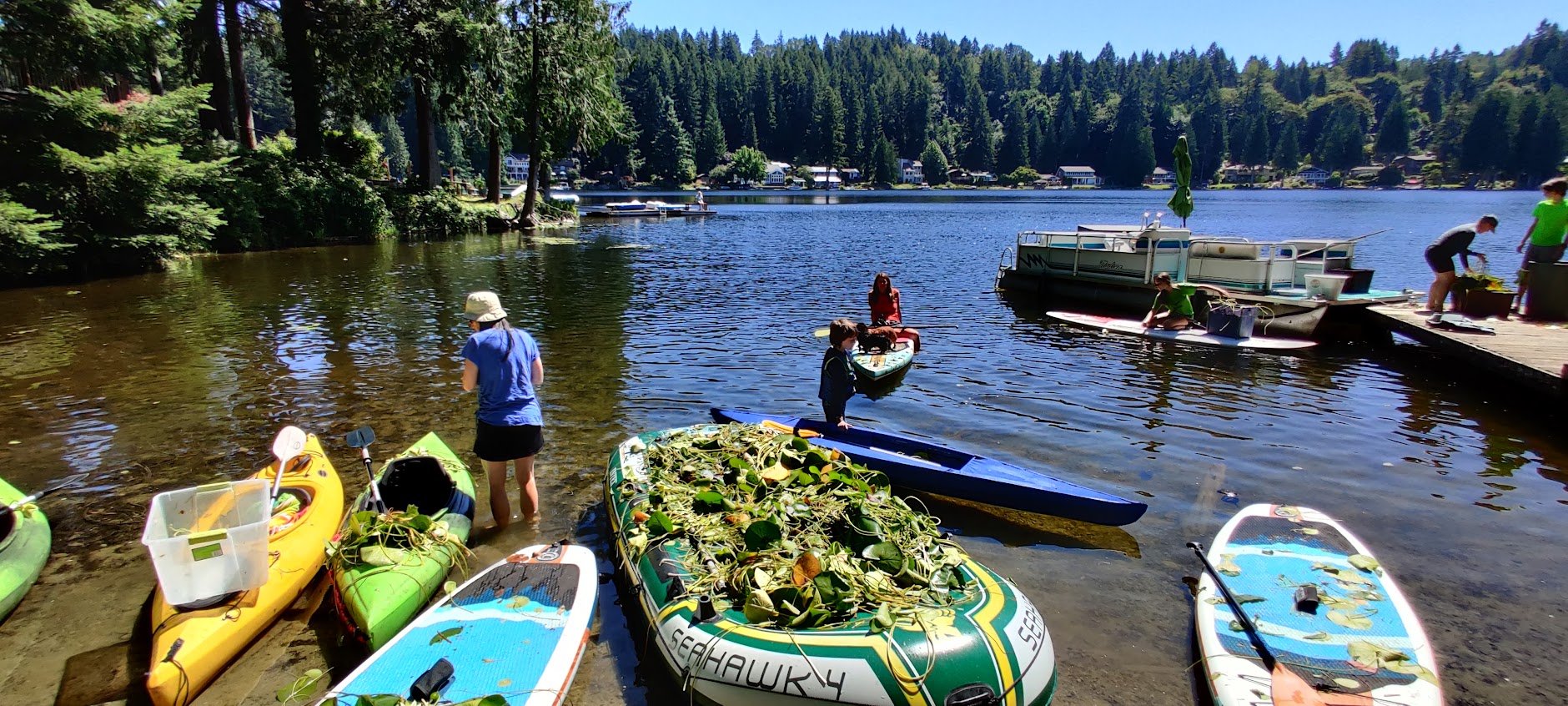
Stewardship
the careful and responsible management of something entrusted to one's care.
How can I contribute to the health of Ames Lake?
-
Algae is a normal part of the lake ecosystem. If you see a suspected algae bloom, which means a large amount of algal growth, please take a photo and send an email describing what you see to the Ames Lake Community Club Board, at alccneighbortoneighbor@gmail.com. We will check it out, and if necessary get a sample to the lab.
We have never had a toxic algae bloom on Ames Lake, but there is no way to know for sure if it’s toxic or not without testing. So please take an appropriate level of caution if you see a large amount of algae, and report it so it can be tested!
In general, for you and your pets:
Avoid contact with algae. Avoid swallowing water while swimming. Take a bath or shower with warm soapy water after coming into contact with the lake water.
-
Fragrant Water Lilies, though beautiful, are an invader in our lake. We are in the middle of a long-term project to manage and eventually eradicate them.
If you like working outdoors, and being in or on the water, we could use your help! Every Saturday morning from July through September we have on-the-lake work parties to remove fragrant water lilies and their roots.
We also have a unique and wonderful water-lily cutting rig on a boat, which we call Jaws. Volunteers are needed to run it, too!
Keep an eye out for the newsletters and on Facebook for the many volunteer opportunities, or send us an email to join our crew.
-
Noxious weeds are a danger to our environment and the economy. These introduced species cost our region millions of dollars in lost agricultural production, environmental degradation and added maintenance costs. Once invasive plants spread to natural areas, they harm native plants and wildlife and can be impossible to eradicate.
More Information -
In addition to the water lilies, the ALCC and King County are also trying to eradicate Purple loosestrife from Ames Lake. Purple Loosestrife, a regulated Class B noxious weed, is a 6-10-foot-tall perennial that grows on lakes and waterways throughout King County. It looks a lot like a mint, but with tall spikes of beautiful magenta flowers.
The ALCC and King County survey the lake every summer, removing all the plants we find. There are many look-alikes. If you think you might have purple loosestrife on your property, please follow the link below for correct identification, and information about monitoring and control.
-
Native wildlife is threatened by invading species. On a lake, most of the invasive species arrive by boat. Please always check your boat and motor before putting it in Ames Lake. We are very lucky, in that we don’t have any of the worst submerged invasive plant species, like hydrilla, or Eurasian milfoil. It’s up to all of us to keep our lake clean.
For more information about how to prevent invasive species from coming into Ames Lake, click the link below.
-
Treating plants or controlling garden pests with chemicals often makes the situation worse. Healthy soil is full of beneficial bacteria, fungi, and other organisms that work together to keep disease and pests under control and protect the health of plants. Chemicals damage the soil's natural defense system by killing off good organisms and bacteria along with the bad.
It's easy to keep your soil's organisms happy with a good food source (compost) and a healthy place to live. Here's how:
Build healthy soil: Amend your soil annually with good-quality compost. This will restore the natural array of beneficial organisms and provide them with food and habitat.
Plant right for the site: Ask your nursery which plant species and varieties have good resistance to common Northwest plant diseases. Choose plants that are resistant to pests.
Be strategic if you spray: The broadcast application of pesticides and herbicides rather than localized spot-treatment can end up killing off some of the beneficial organisms in your garden. After spot treating pests and weeds, give your plants a boost with a layer of mulch and compost.
Encourage diversity: Plant a variety of species and consider using plants that are native to our area external link to encourage vigorous and robust plant and animal life.
Stay informed.
Your choices matter.
Clean, healthy lakes are ideal places for people to fish, swim and enjoy life in many ways. Healthy lakes also provide habitat for fish and wildlife to thrive. To preserve a lake's quality and beneficial uses, people living within the watershed have a special stewardship role.
Here are some ways to keep our lake healthy.
Septic Tanks Must Be Maintained Regularly
Proper maintenance of home septic systems is one way home-owners can help keep a lake healthy and clean.
- King County
Scoop up Pet Waste!
Dog poop is more than just an icky nuisance. It’s a health risk to dogs and people, especially children. It’s full of bacteria that can make people sick. And it’s a source of water pollution. When it rains, dog poop melts away and runoff carries it to storm drains, ditches, and streams that feed rivers, lakes, and marine waters.
The bacteria can also make water unsafe to drink or to swim in. Nutrients from dog poop can also feed the growth of aquatic plants and algae. As these decay, they use up oxygen in the water that fish and other aquatic life need.
Fertilize Only As Necessary
Go organic and slow release!
Natural organic or slow-release fertilizers provide nutrients in small amounts over time - just the way your plants need them! Quick-release fertilizers are highly soluble, and water and rain can wash them right down the storm drain - directly into local waterways where nitrogen causes algae to grow, depleting oxygen and suffocating aquatic wildlife.
